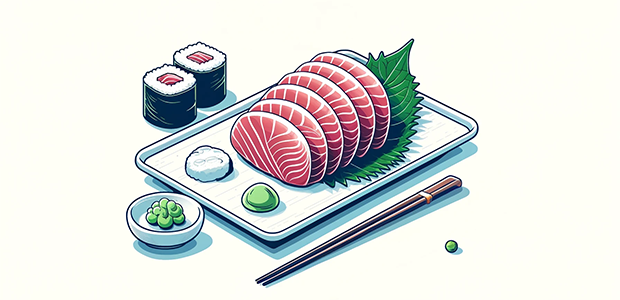
Wanda Fish Unveils First Cell-Cultivated Bluefin Tuna Toro Sashimi
Cell-based seafood maker Wanda Fish unveiled its first cultivated bluefin tuna toro sashimi. The creation of this prototype addressed the burgeoning demand for bluefin tuna via a pollution-free, quality-consistent, and sustainable supply of the highly sought fish.
The raw toro specialty was composed of the underbelly of the fish. It had the highest fat content, with especially high omega-3 levels. This awarded it a unique buttery sensation, making it the most tender and desired meat of the fish. Wanda Fish’s cell-cultivated sashimi possessed the same sensory features of wild-sourced toro sashimi and was imbued with comparable nutritional richness, especially protein and omega-3 fatty acids.
The secret is in the technology’s fat formation
Wanda Fish’s cell-cultivated adaptation of the 3D filet combined the cellular mass of muscle and fat created from the bluefin tuna’s own cells, developed together with a plant-based matrix. The company enlisted skilled chefs to bring its sashimi to culinary perfection.
Wanda Fish’s patent-pending technology to induce native fat formation in bluefin tuna cells and a whole-cut downstream manufacturing process employed a rapid, low-cost, and readily scalable production method. The fat endowed the cultivated fish whole cut with not only its velvety texture but also its unique, rich flavour and essential nutrients, including omega-3s.
“A key focus in the creation of our product was achieving the same level of fat marbling as real Bluefin toro sashimi to create the same look and mouthfeel,” reveals Daphna Heffetz PhD, co-founder and CEO of Wanda Fish. “Reaching this milestone demonstrates Wanda Fish’s ability to bring to market a whole-cut bluefin tuna toro filet without harming the ocean or diminishing the population of wild fish. The product is sustainable, and of course free of microplastics, mercury, and other chemical toxins all-too-commonly found in wild catch.”
“Our prototype is unique in the cultivated food industry, as there is no cooking or panning of the product”, explains Malkiel Cohen, VP of R&D for Wanda Fish. “Using multiple bluefin tuna cells to create both muscle and fat and our plant-based 3D design, we capture the essence of a raw fish fillet without preservatives, artificial additives, or GMOs.”
Good for the fish, good for business
Bluefin tuna is considered the pinnacle of tuna species. They are no easy catch, not only because they are one of the ocean’s fastest and long-distance swimmers, making them difficult to raise in captivity, but also because they are a prized marine delicacy. Overfishing and illegal fishing have prompted governments to place caps on fishing activity by implementing strict fishing quotas, which has also contributed to its premium price.
Toro sashimi is a luxury dish served mostly in high-end restaurants across Japan but is also available in exclusive sushi outlets globally. A single 1 kilo serving can cost USD100 or more.
“Cultivated bluefin tuna is one of those rare food products that makes good business sense,” says Yaron Sfadyah, VP of Business Development & Marketing for Wanda Fish. “It is in high demand, with limited alternatives that match the taste and texture of the wild fish, and at an ideal price point and distribution model.” Alternative protein companies often contend with high manufacturing costs, coupled with the low price of animal-based products. It is a completely different story for cultivated bluefin tuna.”
“Our scalable platform for producing this premium product, raises its potential to reach price parity with traditionally raised bluefins, speed its journey to the marketplace and maximise profit margins,” adds Heffetz.
The start-up will first introduce its tuna in the high-end food service sector, with a focus on Japanese cuisine, where sushi and sashimi are traditional features. “Our focus on bluefin tuna as our first product was driven by market needs rather than technology driven,” adds Heffetz.

